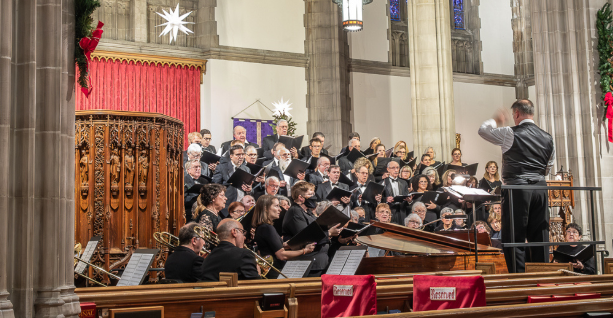by Jarrett Hoffman

Western Reserve Chorale invites interested vocalists to join for the remainder of the season, which includes performances of Brahms’ Ein Deutches Requiem in March and a program of American choral music in June. The ensemble rehearses on Tuesday evenings, 7:15-9:30 at Church of the Saviour in Cleveland Heights, resuming on January 9.
“WRC is a non-auditioned community chorus. Our repertoire does require prior musical experience and a willingness to spend time learning the music. We encourage interested singers to come to a rehearsal or two in order to determine if you would enjoy singing with the Chorale.” Send an email to let the ensemble know that they should expect you in January and what vocal part you sing.
Apollo’s Fire’s board president, Charles Bittenbender, has been nominated as a 2023 Notable Nonprofit Board Leader from Crain’s Cleveland Business. Read here.
INTERESTING READS:
An article in Wine Enthusiast delves into the intersection of A.I. and criticism — in this case wine criticism. On one hand, Jason Wilson notes how unnerving it is that artificial intelligence is doing “things we thought were innately human—to write, create art, make music… and perhaps now ‘taste’ wine.” On the other, he suggests that perhaps the astounding accuracy of A.I. wine identification “can free up the sommelier or critic to focus more on the emotional, romantic side…By leaving the blind tasting and quantifications to the robots, perhaps we can reclaim what’s human about wine.” Read here.
In another peculiar handshake between arts and technology, the Melbourne Symphony Orchestra recently performed with soprano Maria Callas — 46 years after her passing — and Tim Byrne reviewed it for The Guardian. Click here to read “Maria Callas’s hologram concert: ersatz simulacrum of a dead diva is weird and depressing.”
TODAY’S ALMANAC:
by Daniel Hathaway
On this date in 1737, Italian luthier Antonio Stradivari died in Cremona, having crafted some 1,100 instruments — mostly violins, but also violas, cellos, harps, guitars and mandolins, of which some 650 survive today. That includes instruments in the collections of the Library of Congress and the Smithsonian Institution, which regularly make appearances in concerts. View a fascinating list of Stradivari’s surviving instruments, their owners, and lendees here.
There’s a mystique about the stringed instruments that came out of the ateliers of the great 17th and 18th century Italian makers in Cremona. Multiple explanations have been put forward about what makes them stand head and shoulders above those of other makers (watch The Secret of the Violin here), although there are performers who debunk their superiority over later instruments.
Strads are priceless these days. Many are owned by hedge funds and put out on long-term loans to performers, or are held in museums or libraries where violinists are hired to play them regularly to keep their sound alive. That hasn’t prevented artists from leaving their instruments in taxicabs (as did cellist Yo Yo Ma and violinist Philippe Quin in New York) or in the luggage rack of a train (as did an unnamed violinist in Germany). All were happily returned within a few hours. Other instruments have simply been stolen, as in the case of Roman Totenberg’s fiddle, which disappeared from his office at the Longy School of Music in 1980 only to be recovered 35 years later.
Back home in the U.S., today marks the anniversaries of a number of American composers: the birth of Edward MacDowell in 1860, the death of Louis Moreau Gottschalk in 1869, the death of Horatio Parker in 1919, the birth of Bang-On-a-Can founder Julia Wolfe in 1958, and the death of Daniel Pinkham in 2006.



